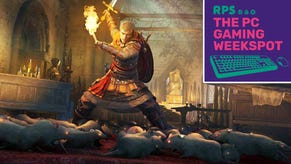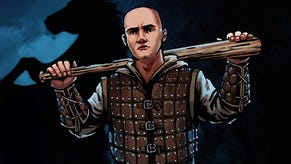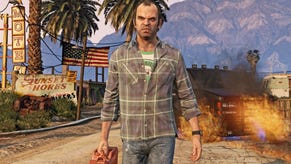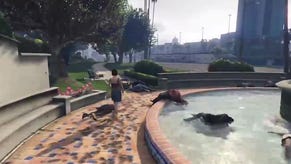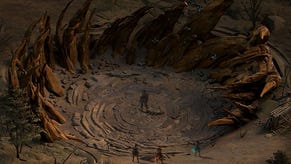Develop '09: Elite vs GTA: Designer Mash-Up
Kieron and I have been expanding our minds and destroying our livers at the annual Develop conference in Brighton, Blighty for the last couple of the days. One of the highlights of the show so far has been David Braben, he of Elite fame, and Dave Jones, he of APB and GTA1 fame and their 'designer mash-up.' The concept - they play each other's most iconic game, and provide retrospective commentary about their time making these two goliaths of gaming history. Some ramblomatic highlights below...
First up, Dave Jones grapples with the original Elite, running in a Spectrum emulator, while Braben takes the mic. (Important note - I caught a flash of his underpants while he was attaching it. It was the most erotic moment of my life). "It’s amazing how times have changed sice both elite and gta game up", quoth he. "It’s interesting the criticism elite got at the time for being 3d." It was made by two guys in 18 months, which is astonishingly far away from the dozens-strong teams of today's blockbusters. "We were incredibly secretive about it because the expectation was every game was going to be 3d by the time we came." Fortunately they weren’t.
Less fortunately, " the publisher response was very negative. Most of the games on sale on the time were clones, basic ripoffs of Pac-man and Space Invaders. One of the publishers' criticisms of Elite was they wanted 3 lives and a play time of no more than ten minutes. We just didn’t understand that."
Meantime, Jones is making a horrible mess of things - "the joy of docking", grins Braben. That said, he seems to have forgotten quite a few of his own game's controls, so takes a while to help Jones out of his hole. Eventually, though, Jones manages to find a few pirates to tussle with. "It’s amazing how intelligent we were told the bad guys are," says Braben, "when really it’s random numbers being told to attack you."
As Jones suffers his first of several embarrassing defeats, Braben talks about Elite's complexity. "We gave a whole load of features to the player, then took away lots. There were too many fiddly little things to do at the start, so we actually sold them back to the player." He and co-creator Ian Bell were still concerned about the game's appeal.
"We were afraid that we were up against very bright very colourful games. It actually takes some dedication just to get into the game. The advantage we had was they’d already waited 20 minutes for the cassette to load, so at least they were going to give us a chance."
Meantime, Dave jones can’t work out how to turn right. Braben helps out, then rues that plenty of people struggled at the time too. "It was very much not a centre the sight the game. A lot of people’s experience was a strange triangle appearing on the screen for a second and then going away again."
Dave Jones gets killed again. While he goes off in search of something to fight one more time, Braben goes more into the original motivations behind the game. "The fundamental thing both ian and I thought with games was if you’re just shooting to get a score it wasn’t very satisfying. What we wanted to do was to get some motivation. SotThe idea of trading came up. We actually though of rising through the ranks of the navy but that seemed to complicated, too much work. Then we realised that you could be a pirate as well as being pirated." Which, in turn, led to concept of smuggling. "Quite controversially we put in various illegal goods that you could trade –slaves, firearms and narcotics. Which, given the fact this was a BBC computer…"
Fun fact time number one: "If you look at the games of the 80s, almost all of them are left-handed. It didn’t cross my mind that that was an issue, not until I saw someone at a show playing Elite with their arms crossed over."
Fun fact time number two: "The whole of Elite is smaller than an average email" Hundreds of planets in 22K? It's incredible, really.
Dave Jones suffers his final defeat and gives up. "It was an age where game designers were almost competing with players to make their games hard to play," explains Braben. "In those days we were writing games for ourselves.
From a game design point of view there’s a danger of being too close to a game. You end up making it harder and harder because you no longer find it a challenge."
Nontheless, this strange, proto-3D, punishing space sim was an enormous hit in Europe. "Acornsoft really put themselves behind it – the print run was 50k, even though their highest selling game to date was 30k. Those units sold out in less than a week."
And now, GTA time - Braben playing and Jones speaking.
"We started this in 1995. It took about two years really. The initial idea for the game was you played the police – it was orginally called Race and Chase." Fascinatingly, "one of the things that really insired this game was pinball.
What a lot of people didn't realise was how you completed it. You just have to get 1m points and you finish the game, you win the city. BUtWe knew people probably wouldn’t want to do missions for a while, so we had things like you shoot a car with one bullet and you got ten points." Whenever you won points, you're shown an expanding number zooming out of your character. "The dotmatrix stuff was emulating pinball. I thought a pinball table was the seminal game design. It had immense feedback – one player, two buttons."
Uh oh. David Braben has found some Hare Krishnas. Jones becomes excited: "Hare Krishna bonus! Kill the hari krishnas! Get them all in a line! We picked the people who are so peaceful… even though they’re upset, the krishnas don’t do anything about it." The police do however, and Braben's heat rating rises. We wanted some kind of comeback on you. Of course, that became a challenge for players – how long can I survive on maximum heat?"
Jones goes into some of DMA's own challenges in making the game too. "Being an open world game design the number of problems you had to solve - you never really knew where the player is. For instance will a car's doors open in a narrow street? Testing an open world freeform game is an absolute nightmare. The number of compound bugs you get: if you do this, if you do this…"
Then there's the matter of the great controversy around the game. Very much deliberately courted, as it turns out.
"We actually employed Max Clifford [notorious British celebrity publicist]. He’s a very very smart guy. We described the concept to him and he said it was absolutely shocking. The when we showed him the game and it was this cartoony, top-down 2D thing he said that’s not very shocking. So, what said was describe the game to people but don’t show it. And 10 days later, we’re on GMTV." Bingo - instant scandal. "When we finally let a few politicians see it, the look on their faces was a sight to behold."
This prompted Braben wish he'd employed Max Clifford, and sharing some more anecdotes about how they promoted Elite at the time. That done, it's time to drag myself off to a fascinating talk about architecture in games, despite my annoyance that our own Jim Rossignol (an occasional contributor to BLDGBLOG) hadn't been asked to take part in it....


